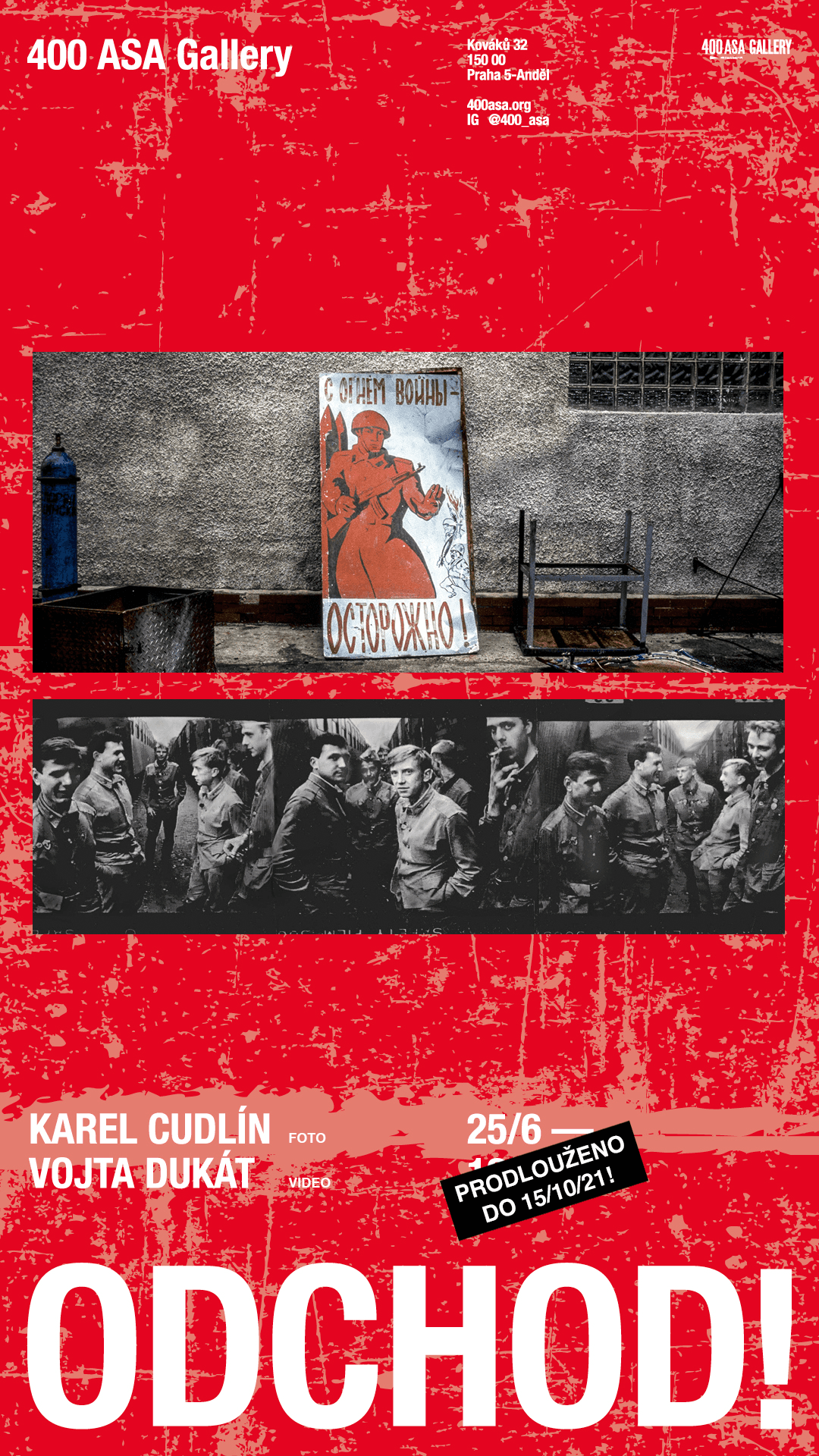
ODCHOD! – Karel Cudlín a Vojta Dukát
25.6. – 15.10.2021
400 ASA Gallery
Open Tue – Sun, 11 AM – 18 PM
EXHIBITION extended to 15th October!
“ODCHOD!” by Karel Cudlín and Vojta Dukát opens on the 30th anniversary of the departure of the last Soviet soldier from the former Czechoslovakia, which falls in June this year. The exhibition is composed of previously unpublished colour photographs from Karel Cudlín’s slides from 1990-91. Nearly 45 photographs map not only the departing soldiers, but above all what was left behind. The photographs will be complemented by an exclusive screening of a short film by Vojta Dukát, who together with Karel Cudlín filmed the last days of Soviet soldiers before their removal.
If you wanted to know what the legacy of totalitarianism looks like, you’ve come to the right place. When the military forces of the Warsaw Pact armies entered Czechoslovakia by force in August 1968, few people could have imagined that their presence, declared temporary, would cover the childhood, adolescence, and early middle age of a generation. The Soviet army, the army of an aggressive state whose only argument in foreign policy was the tank, occupied a number of military installations throughout the country and established its order. And not only there. It established its order throughout Czechoslovakia. The Czechoslovak communists quietly threw away the revival process, embraced the occupiers, and began to tighten the social screws. The Communist Party based its power on Russian tanks, whose traffic accidents were not investigated. Military facilities used by the occupiers, often historically valuable buildings, were devastated. The general devastation was, moreover, painted over with picturesque scenes from the lives of soldiers or heralds of better tomorrows and the red kingdom of the proletariat. “When the occupying army finally left, we found behind fences and wire barriers the imprint of Soviet reality.” The imprint of disrespect for everything from the landscape to human life. The ground was covered with shards of the Soviet desire for imperial glory, of which only illegible messages and Lenin’s broken head remained. The ground was soaked with diesel, fighter jet fuel, but also with Soviet presence. The withdrawal of the Soviet troops was a necessary and essential step, but to this day the ground in the barracks and airfields where the Russian imperial empire reigned is still saturated with disrespect, with the belief that it is easier to seal a window with a newspaper than to reglaze it, with the belief that it is quicker to cut down a fruiting fruit tree than to comb. We’ve managed to clean up the biggest mess, but we’ll be dealing with the soaked ground for a long time to come. We will be coming to terms with the fact that our homeland has been devastated for decades by troops of a foreign army acting as if they were in conquered territory. Above all, we will come to terms with the fact that many of us didn’t really mind because it happened behind walls, and that for some of us the presence of the occupiers was a blessing.
Jiří Padevět
Karel Cudlín
Photographer and teacher Karel Cudlín was born in Prague. He graduated from the gymnasium, the secondary school of social and legal studies and in 1987 he graduated from FAMU in the Department of Artistic Photography. In 2015-2016 he was the head of the Studio of Documentary Photography at FAMU, and in 2016 he was habilitated as an associate professor.
He cooperates with publishers, publishing houses, television and film productions in the Czech Republic and worldwide. In 1997-2003 he was one of the official photographers of the president of the republic Václav Havel. The core of his work is documentary photography and his projects are often created in cycles of several years. He has held dozens of solo exhibitions in the Czech Republic and abroad and is the author or co-author of many photographic publications. Karel Cudlín is also the recipient of 17 Czech Press Photo awards and the Revolver Revue award and is a founding member of the 400 ASA collective.
Vojta Dukát
Moravian photographer Vojta Dukát was born in 1947 in Brno and went into exile in the Netherlands after the occupation of Czechoslovakia by the Soviet army in 1968. He traveled the world and became known in the genre of humanistic photography. He does not work systematically – he tries to remain more of a “professional amateur”. Since the mid-1980s he has reduced his photography in favor of video. From 1974-1978 he was the nominated photographer of the Magnum agency in Paris. He has been recognized for his long-term contribution to the visual arts. In 1997 he received the Capi-Lux Alblas Prijs – NL and the cultural prize of the city Den Haag, the Ouborg Prijs in 2001.
